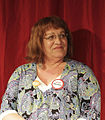Portal:Transgender
Welcome to the Transgender portal Being transgender is distinct from sexual orientation, and transgender people may identify as heterosexual (straight), homosexual (gay or lesbian), bisexual, asexual, or otherwise, or may decline to label their sexual orientation. The opposite of transgender is cisgender, which describes persons whose gender identity matches their assigned sex. Accurate statistics on the number of transgender people vary widely, in part due to different definitions of what constitutes being transgender. Some countries, such as Canada, collect census data on transgender people. Generally, fewer than 1% of the worldwide population are transgender, with figures ranging from <0.1% to 0.6%. Many transgender people experience gender dysphoria, and some seek medical treatments such as hormone replacement therapy, gender-affirming surgery, or psychotherapy. Not all transgender people desire these treatments, and some cannot undergo them for financial or medical reasons. The legal status of transgender people varies by jurisdiction. Many transgender people experience transphobia, or violence or discrimination towards transgender people, in the workplace, in accessing public accommodations, and in healthcare. In many places, they are not legally protected from discrimination. Several cultural events are held to celebrate the awareness of transgender people, including Transgender Day of Remembrance and International Transgender Day of Visibility, and the transgender flag is a common transgender pride symbol. (Full article...) Selected articleTransgender hormone therapy of the female-to-male type (FTM), also known as masculinizing hormone therapy, is a form of hormone therapy and sex reassignment therapy which is used to change the secondary sexual characteristics of transgender people from feminine (or androgynous) to masculine. It is one of two types of transgender hormone therapy (the other being male-to-female), and is predominantly used to treat transgender men and other transmasculine individuals. Some intersex people also receive this form of therapy, either starting in childhood to confirm the assigned sex or later if the assignment proves to be incorrect. The purpose of this form of therapy is to cause the development of the secondary sex characteristics of the desired sex, such as voice deepening and a masculine pattern of hair, fat, and muscle distribution. It cannot undo many of the changes produced by naturally occurring puberty, which may necessitate surgery and other treatments to reverse. The medications used for FTM therapy include, mainly, androgens (namely testosterone) and GnRH analogues... Selected biographyChristopher "Christoph" Lee (September 4, 1964 – December 22, 2012) was an American transgender activist, and award-winning filmmaker in the San Francisco Bay Area community. He was also the co-founder of Tranny Fest, now called the San Francisco Transgender Film Festival (SFTFF). In 2002 he was the first openly trans man Grand Marshal of San Francisco Pride. Lee's death and the designation of his assigned gender at birth on his death certificate rather than his self-identified gender was the impetus behind the "Respect After Death Act", AB 1577, which was passed in California on September 26, 2014. Did you know (auto-generated) -
This month's birthdays
More did you know...
Random quoteThey can try to ban us. They can try to get rid of our health care. They can try to deny us housing, credit, and public accommodations. They can try to shame us. They can try all they want to erase us, but at some point, they will realize the trans community is never going away. Trans people are everywhere. Every country, every race, every ethnicity, every religion, every socioeconomic level, every period of human history — we are everywhere. We are natural. You can’t rid of what’s natural. I think they know that, and it terrifies them. Related portalsSelected picturesTopics
CategoriesWikiProjects WikiProjects are non-hierarchical peer-run groups which serve as a resource for the communication on, and collaboration of, content within a specific topic area. Related WikiProjects: Things you can do
Associated WikimediaThe following Wikimedia Foundation sister projects provide more on this subject:
|





























